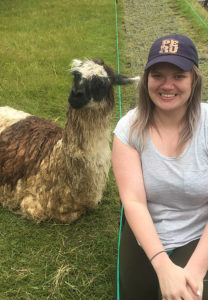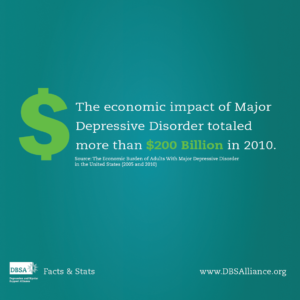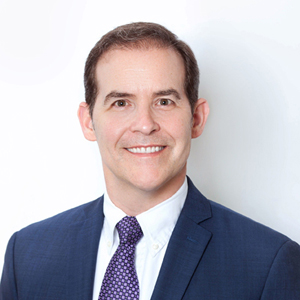Support groups, friends, families—all of these are just examples of the communities we might belong to. We rely on community and community relies on us. We prod each other to keep moving forward and live our lives with a sense of belonging and passion—together. In this eUpdate, read about how individuals in the DBSA community both inspire and embrace their communities to stay connected and well.
Life Unlimited: Cassie Griffith

One cannot talk about the light without mentioning the dark, one cannot talk about who they are without mentioning their past. I want to talk about my darkest moment, where I got to a place I never thought I would get, because it is important. It is important to share our positive and negative experiences with the world.
My darkest moment came not long ago actually. I was experiencing a mixed episode, something I had not experienced for years. I was cycling from very low, unable to get out of bed to manic and excessively self-destructive. I reached a place I had never reached before; during this time, I self-harmed for the first time. It is not something I am proud of, but it happened. I reached out to my work to request time off, concerned that I would again be hospitalized. My work was wonderful they gave me the time off and started the paperwork for Short Term Disability. I had to find a way to come back from the darkness, but I was lost. I have been passively suicidal since I was 8. I experience passive suicidal thoughts nearly every day, but this was an area I had never ventured into before; these were active concerns. I started to stay away from home where there were risks for me, I avoided trains, bridges, and major highways. I knew that I needed assistance but I struggled to find it, I could not afford PHP and hospitals did not want to admit me. I struggled and I struggled HARD.
However, this is not a sad story it is a recovery story. Recovery happened thanks to my team. My team of professionals, yes, my therapist and psychiatrist were instrumental, however, the real unsung hero here are my friends who came together to make sure I did not spend a night alone. My friends who continue to check on me, who reach out to me during the night and continue to reach out in the light. They brought me food when I could not get out of the bed, they sat with me while I started into oblivion and did not make a fuss over it, they listened when I could not stop talking, they redirected my energy from destruction tasks to safe tasks, and they never stopped. My mother who I would call crying about wanting to be “normal” and who reassured that all would be okay that I had a mental illness no different from a physical illness. I recovered, I am back at work, I am back walking home every night and I am back to being me.
I recovered, thanks to my team. My team is diverse and spread across the country and across multi-roles in my life. My life is a roller coaster and I have learned to accept the dips and the climbs as part of the ride, and I am glad that I am on this ride with my team.
Meet the Winners
Last month in San Francisco, DBSA honored top researchers at our 2018 Gerald L. Klerman Awards. Every year, DBSA recognizes researchers whose work contributes to understanding the causes, diagnosis, and treatment of mood disorders. Awards are given out in the categories of DBSA Gerald L. Klerman Award, Senior Investigator and DBSA Gerald L. Klerman Award, Young Investigator. Some recipients have received the honors of Young Investigator, and because of their continued work in the realm of mood disorders, have been awarded the Senior Investigator award. This year, in addition to the Gerald L. Klerman awards, a special DBSA Lifetime Achievement award was given to Gregory Simon, MD, MPH, for his ongoing commitment to serving as a champion and advocate in supporting DBSA’s mission. The awards were presented at the DBSA Scientific Advisory Board reception, in conjunction with the annual conference of the American Psychological Association (APA).
We are excited to introduce you to our winners:
Holly Swartz, MD – 2018 Gerald L. Klerman Senior Investigator Award
Holly A. Swartz is Professor of Psychiatry at the University of Pittsburgh School of Medicine. She received her medical degree from Albert Einstein College of Medicine and completed her psychiatric residency training at New York Hospital /Cornell University School of Medicine. Dr. Swartz’s research focuses on understanding and optimizing psychosocial interventions for mood disorders. She is well known for her work evaluating Interpersonal Psychotherapy (IPT) and Interpersonal and Social Rhythm Therapy (IPSRT) as treatments for depression and bipolar disorder.
James Prisciandaro, PhD – 2018 Gerald L. Klerman Young Investigator Award
After receiving his B.A. in psychology from New York University, James pursued a Ph.D. in clinical psychology at the University at Buffalo. As a graduate student, he conducted a number of investigations concerning the latent structure of mood disorders. Across his research and clinical endeavors, James witnessed the frequent co-occurrence of substance use and mood disorders and the devastating impact this comorbidity had on prognosis and course of illness. James joined the Addiction Sciences Division at the Medical University of South Carolina (MUSC) as a postdoctoral fellow to supplement his experience in mood disorders with training in addiction research.
Argyris Stingaris, MD, PhD – 2018 Gerald L. Klerman Young Investigator Award
Dr. Stringaris serves as the Chief of the Mood Brain and Development Unit at the National Institute of Mental Health, National Institutes of Health, Bethesda, MD, USA. Dr. Stringaris is a Child and Adolescent Psychiatrist and neuroscientist who did his residency at the Maudsley Hospital London, obtained his PhD from King’s College London, UK, and completed his clinical research fellowship at the NIMH in the USA. He received his medical training at the University of Göttingen in Germany, where he was also a neurology resident. Dr. Stringaris researches depression and related mood disorders in adolescents. His work has uncovered early pathways to depression and has delineated the role of reward processing abnormalities in adolescent anhedonia and depression.
Gregory Simon, MD, MPH – DBSA Lifetime Achievement Award
Dr. Simon, who served as the Immediate Past Chair of DBSA’s Scientific Advisory Board, is a psychiatrist and mental health researcher at Kaiser Permanente Washington in Seattle. His research focuses on improving access to and quality of mental health treatment for people living with mood disorders—with a special emphasis on activating patients or consumers to seek out more effective treatment. He is a Senior Investigator at the Kaiser Permanente Washington Health Research Institute and a Research Professor in Psychiatry and Behavioral Sciences at the University of Washington. He also serves on the NIH All Of Us precision medicine advisory panel.
Gerald L. Klerman (1928-1992) was an educator, researcher, clinician, author, and administrator who specialized in depression, schizophrenia, panic and other anxiety disorders. He was also one of DBSA’s earliest supporters. He is credited with showing the efficacy of medication and psychotherapy in preventing recurrent depression. This evidence-based treatment is widely used today and modified for the adjunctive treatment of patients with bipolar disorder who are undergoing pharmacotherapy.
Our Advocacy Worked: Medicare Maintains Part D Medication Protections
DBSA advocates helped to prevent dangerous proposed changes from taking effect!
DBSA, along with our advocates and a broad coalition of health care stakeholders including over 20 diverse patient advocacy organizations, helped convince the Centers for Medicare and Medicaid Services (CMS) to not finalize a proposal that would have weakened Medicare beneficiaries’ access to anti-depressants, antipsychotics, and immunosuppressants.
This policy commonly referred to as “Six Protected Classes” was created by Congress when Medicare Part D became law. Medicines in the six protected classes treat serious health conditions, and this policy recognizes that within these classes, medicines are not interchangeable. Drugs in the same class often have different side effects, and patients are often better suited to one particular drug over another.
This rule cements Medicare’s protected classes policy as an essential patient safeguard in the Part D prescription drug program. While you may not be a Medicare beneficiary today, most of us will be someday in the future, and historically Medicaid and private insurers have followed Medicare’s example on policies around access.
This decision was bolstered by the support of over 120 Members of Congress, including fourteen bipartisan Senators who sent a letter to CMS and seventy-three House Members who sent a letter to the Department of Health and Human Services (HHS). But most important, this decision was aided through the mobilization of advocates who wrote letters to CMS, HHS, and their Representative and Senators.
Ask the Doc
Looking Back at an Amazing Mental Health Awareness Month

May has come and gone, and, with it, so has Mental Health Awareness Month. Thank you to everyone who participated in DBSA’s Charity Livestream Event on May 18th. We want to give a special thank you to Diction and General_Mittenz for bringing mood disorder education and awareness to the Twitch community. Because of their efforts, $3,000 was raised for DBSA in only 8 hours and over 80,000 people were touched by DBSA’s messages of hope and wellness.
If you are still interested in learning more and spreading awareness about depression and bipolar, please go to our Facebook, Twitter, Instagram, and like, comment, and share posts from our Facts & Stats educational campaign.
Use Your Lived Experience to Work as a Peer Specialist
A Peer Specialist is an individual with lived recovery experience who has been trained to help peers in providing support as they move forward in their own recovery. As a person who has traveled a similar path, a Peer Specialist fosters hope for recovery and role models that reality to the peers they serve.
DBSA’s enhanced course incorporates distance learning and a 5-day in-person session. Participants will reflect on their own journey and how to develop skills that draw upon that experience to assist others in their recovery.
Course work includes outside reading, completion of homework assignments, group distance learning discussions, quizzes, role-play evaluations during the 5-day in-person session and a final test. Students must be available to attend all activities and achieve a passing grade on all quizzes and the final test to receive a certificate of completion.
Learn more about how to enroll in the DBSA Peer Specialist course
Note from Michael
Never doubt that a small group of thoughtful, committed citizens can change the world; indeed, it’s the only thing that ever has. – Margaret Mead

Over the last several months, I have the good fortune to meet and speak with many DBSA constituents and gather their input and feedback on the value our national organization plays. I was also reminded of the importance of our chapters and the resources we collectively offer to individuals living with depression or bipolar disorder. Most importantly, I learn about people, their experiences, and their insights and suggestions to make DBSA a better organization.
I wanted to share just a few examples:
- The Colorado Springs chapter offers a Veteran support group. During a call with their board of directors, they helped me better appreciate the value of offering support groups to Veterans. More specifically, James (who facilitates the group) explained that hearing war stories were often triggering events for those who had not served in combat. But those who did, continue to need a safe place to share their experiences. Ideally, they would hold two separate Veteran support groups—one for those who experienced combat; another for those who have not. Until the chapter can recruit and train more Veteran facilitators, they continue to balance the needs of all Veterans who seek peer support.
- I met with Gavin during a recent visit. He shared his story as a troubled teen, which eventually led him to his local chapter where he received support. Gavin’s talents and interests in technology led to discussing and sharing our Wellness Tracker app and a discussion on whether a similar tool would have benefited him during his teen years. Gavin was so appreciative of our request for his feedback. By the next morning, he produced an outline for a new app more relevant for teens living with depression and bipolar. He continues to work with us on this and other technology projects underway.
- The DBSA Roland Park chapter (Baltimore area) recently added two new support groups, with a third on the way. One of the new groups, while open to anyone with a mood disorder, is located in a local LGBTQ+ agency. The addition of these new groups builds on an existing support group for peers and one for family and friends. This kind of growth doesn’t occur without determination and commitment. In this case, the expansion of these groups is primarily the work of one board member, Vicki, along with the support of her husband, Lou. Vicki explained that she focused on training new support group facilitators—15 in just the past few years. Vicki and Lou also found new locations for the groups in different areas of Baltimore and focused on increasing their promotion of the chapter on their website and social media.
I’ve heard from dozens of peers, family and friends, and clinicians on the impact DBSA support groups and resources have had in people’s lives. The important takeaway for me is that these services are possible through the sheer will on committed volunteers, like James, Gavin, Vicki, and Lou. They represent hundreds of volunteers achieving similar objectives and we are grateful for whatever role you are playing to make a difference.
July is Minority Mental Health Month
While every person’s mental health journey is unique, DBSA knows that racial minorities face particular challenges to wellness. Being a person of color can make it more difficult to receive a correct diagnosis or quality treatment, and the combination of racial identity and a mental health condition are often a barrier to stable, appropriately-compensated employment.
Next month, we will be sharing stories from individuals of color in the DBSA community to highlight the ways that race can play a role in mental health and treatment. If you are a person of color that wants to make your voice heard, please email Erica Kadel, DBSA Development Manager, at ekadel@dbsalliance.org by the end of June.
Wellness Tips
Try not hold pent up emotions
Remember that holding in your thoughts or feelings about someone or something is not a smart move because you are putting yourself on the back burner.
Take breaks, even when you don’t think you need them
Know what increases your stress level. Recognize when you are feeling more stress and need to step back from your work. You might want to take a short time out to meditate, do a relaxation exercise, listen to music, or read a helpful brochure.
Believe in yourself
Think of all the thousands of things you’ve done, accomplished, and pursued. You can handle today.


